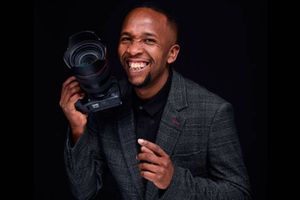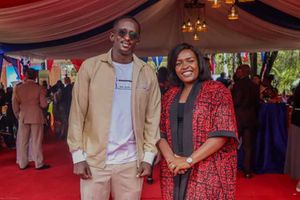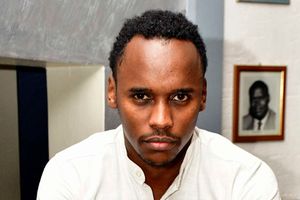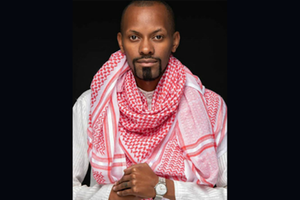
From left: Job Maina, Lovejoy Odongo, James Kioko and Mercy Wambui.
Gone are the days when landing a corporate gig was the only measure of success. Kenya's Gen Z isn't just disrupting the traditional career path—they're setting it ablaze and dancing around the flames.
With smartphones in hand and creativity in abundance, young Kenyans are transforming what they love into what pays. A quick scroll through Instagram, YouTube, Patreon or TikTok reveals this generation's hustle: digital content that turns heads and turns profits, handcrafted treasures that celebrate Kenyan heritage, and innovative solutions to local challenges—all built from passion, not obligation.
For Kenya's digital natives, these side gigs aren't just about topping up M-Pesa balances. They're powerful statements of identity in a country where youth unemployment has pushed creativity to new heights. These young entrepreneurs are weaving their values—whether environmental sustainability or social justice—into business models that speak volumes about who they are and the Kenya they envision.
By tapping into global platforms while maintaining distinctly Kenyan flavours, these youngsters are proving that success stories can begin in bedrooms in Eastlands just as easily as boardrooms in Westlands. Their ventures offer something the conventional 9-to-5 often can't: the freedom to create on their own terms, fulfilment that comes from authentic expression, and financial independence without corporate constraints.
We caught up with four young Kenyans who are rewriting their futures through passion projects:
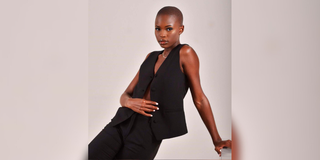
Lovejoy Odongo, 22, is a High Fashion Model and Public Relations Student.
Lovejoy Odongo, 22, balances her Public Relations and Advertisement studies at Co-operative University of Kenya with a blossoming modelling career that's catching the industry's attention.
“When I was growing up, my friends often said I could be a good model. I loved watching fashion shows, especially Tyra Banks, and admired her. In 2016, at 16, I entered the Miss Koru girls contest, though I didn’t take it too seriously. After high school, in 2022, I decided to try modeling. I started with pageantry, then moved on to commercial and high fashion auditions. I learned that in these fields, you get paid immediately after working, unlike pageantry where you win a title to get a prize. In 2022, I landed my first TV commercial with Airtel and began walking the runway for high fashion.
At first, my family wasn’t really on board with it. They suggested I focus on finishing school before diving into modeling, saying I needed to focus on my studies. But for me, I felt that modeling was something I truly loved. Eventually, they started to understand and became really supportive. Having their support pushed me forward because I felt more confident.
Rejection is a big challenge in the modeling industry. Sometimes, you may go to several auditions and not get any responses, but I remind myself not to give up. Rejections happen for many reasons, and it’s important to accept that. Another challenge is clients who don't pay the full rate or don’t provide for meals during shoots. Despite this, I always try to give my best. There are also quiet seasons, but eventually, new opportunities come, balancing things out.
At first, I did have doubts when I was just starting out. I would ask myself, "Am I really going to make it?" and "Is it going to be worth it?" But I was lucky to meet some great friends in the industry who helped me and trained me, and I’m really grateful for that. They made it easier for me to navigate the industry.
As much as I’m passionate about modeling, it’s also about earning money. You can’t just do it because of passion alone; it’s work, and I have to get paid for it.
For TV commercials, the pay is around Sh100,000. For runway shows, it’s approximately Sh20,000, and for brand shoots, it’s about Sh60,000, but this can vary depending on the client.
I’ve also had the opportunity to work with great brands like Tribal Chick, which I did in early February. Working with Tribal Chick and Airtel really opened doors for me.
In the next three years, I see myself going international. I’ve always wanted to work in places like Paris, New York, and Milan. Being on those runways and working with top international brands is something I really believe I can achieve. Right now, my focus is on finishing my studies, I’ll be graduating soon, and then looking for an agency that can take me to the next level. I’ve also been working hard on building my portfolio to make sure it’s diverse and strong. That way, when I approach an agency, they’ll see that I’m worth.”
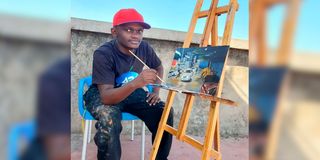
James Kioko, 26, is a Visual Artist.
James Kioko, 26, known professionally as "Artist Kioko," transforms blank canvases into striking masterpieces.
“I started drawing back in class one, doing sketches behind my books. I used to copy the pictures in my textbooks into my book. That's how my passion for drawing grew. Later, in high school, I started taking it more seriously. Sometimes, my teacher would ask me to draw diagrams on the board for the class, and everyone was impressed by my skills.
After high school, I got a mentor who taught me more about art, like using the right materials and how to market my work. This helped me build a foundation for my career. I kept drawing, and my parents supported me, making it easier to get materials. I also started sharing my work on social media, which played a big part in my growth as an artist. In 2017, I discovered other artists' work on Facebook, which inspired me. That's when I started seeing art as a possible career. I did a lot of drawing, mostly of celebrities and famous people. At that time, I wasn't taking it too seriously, I was just having fun and working on improving my skills because I wasn’t perfect yet. I learned a lot from YouTube too.
I kept drawing and posting my work online. Then, in 2020, I drew a picture of the current member of parliament for Langata Constituency Phelix Odiwuor who by then was known as Jalango. Someone on Facebook saw it and offered to connect me with him. At that time, Jalango was hosting an event at a hotel in Lavington. I took my artwork there and presented it to him. That’s when everything changed. He shared my artwork on his socials, and that gave me a huge boost.
I started building a clientele, and focus on portraits. I started getting referrals. The better work I did, the more people appreciated it, and that helped me build my client base.
One of the challenges I faced was finding good materials. Sometimes I had to import them, and that took a long time, which meant waiting for the materials to arrive. Another challenge when I was starting out was not asking for a down payment. People would receive my drawing, and disappear.
Right now, I do both drawing and painting. For paintings, the smallest size, which is the most affordable, goes for Sh5,000. The largest size, which is an A1 size, costs Sh25,000. These prices are for individual portraits based on a photo.
My work is a career, and I'm fully focused on it. I concentrate and enjoy every brushstroke, making sure each one goes where it’s supposed to. That’s what keeps me motivated to wake up every day and do it again.
My biggest achievement has been meeting some well-known people in society. I've had the chance to meet many famous individuals, and my work has been recognised in big offices. Some people have even traveled overseas, helping me build a strong network. As for my plans, I hope to exhibit my work in galleries outside Kenya, like in the US and London, and create a name for myself internationally. That’s my main goal right now.”
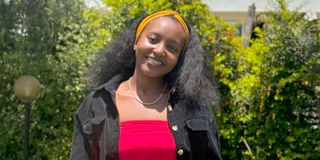
Mercy Wambui Njuguna ,23, is an aspiring baker and university student.
Mercy Wambui Njuguna, 23, a final-year Sociology and Communication student at The University of Nairobi, is whisking up a storm with baked creations that have turned her kitchen experiments into a budding business.
“My passion for baking started when I was in primary school. My brother loved baking cakes for us on weekends when we were home from school. He would bake a cake and then give us a piece to taste, asking for feedback on how it tasted and what he could improve. Gradually, I became interested in baking too. Later, when I went to high school in 2016, I joined home science classes, where we learned baking along with other skills like tailoring.
After high school, I joined Valentine School of Cake in 2020, starting my classes right after Form Four. During Covid-19, we had to take a break, but I kept my passion alive. Once things settled, I decided to make money from baking. With my parents' help, I bought the necessary tools, started baking for my family, and shared cakes with neighbours for feedback.
To market I gave people samples of my work. I remember baking a cake for Mother’s Day for a close family friend. She loved it and helped spread the word to others. My parents were also a huge part of the process; they were really supportive and would tell their friends about my business. Through their help, I got orders for two large cakes from their friends. My mom would deliver them to their offices, and my friends also helped by ordering from me and sharing my work on social media. This support helped me gradually turn my passion into a business.
One of the biggest challenges I face is getting clients who truly value my work. Many people are used to supermarket cakes and often question my prices, not understanding the difference in quality. Supermarket cakes might have been sitting on the shelf for days. With home bakers, the price refers only to the cake itself, not the decorations, so the final cake can weigh more. Another challenge is the inconsistency of orders, as home bakers don’t always get regular business like those with physical shops. It takes time to build trust with clients through online marketing.
Read:
When pricing a cake, the first thing I consider is the type of cake and how the client wants it customised. The design, flavor and the kind of icing they prefer will affect the cost. I also factor in the delivery and the quantity of cake they want. For a simple vanilla cake with soft icing (like whipped cream), I charge around Sh2,100 per kilo.
I consider myself an all-round baker because I make a wide variety of cakes. On a good month, I can make about 20 to 25 cakes, but on a slower month, it’s more like 10 to 15 cakes. On average, I can earn around Sh30,000 a month from baking cakes.
As a student, having my own business motivates me because I no longer have to ask my parents for money to buy what I need. It’s taught me discipline in managing my funds. Before, I didn’t understand how hard it was for them to earn money, but now I value it more. I’ve also learned that to get what I want; I need to work hard. I have bigger dreams, like opening a school or cake supply shop, and this drive keeps me going.”
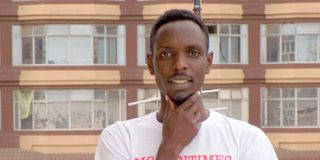
Job Maina Kaniaru, 25, is an Aspiring Master of Ceremony (MC).
Job Maina Kaniaru, 25, commands attention as MC Kantimes, bringing electric energy to events across Nairobi while building his reputation as the MC who keeps crowds buzzing.
“Becoming an MC is something that came out of my personality. I’ve always been someone who enjoys talking to people and listening to them. Over time, I realised that I not only loved talking, but I also enjoyed speaking to groups of people. I discovered that I could turn this passion into something more than just a hobby, something I could make money from. After all, I need to earn money for food, clothing, and other basic needs. So, I decided to explore my hobby as a business.
There was a time when I faced a lot of personal challenges, and I was close to falling into depression. When I shared my feelings with others, they encouraged me to do something with my ability to connect with people. They told me, "Why don’t you become an MC? You have the ability to make people happy when you talk." That advice stuck with me. One day, someone asked me to MC at a fundraiser, and I saw this as the perfect opportunity to try. I offered to do it for free because I wanted to gain experience. The fundraiser was important because it needed someone who could motivate people. I took on the challenge, and it went really well. After that, I was invited to two more events, which was a great start for my MC journey.
I love talking to people, and some people even suggested that I could be an actor because I make people happy with my humour. However, I decided to focus on being an MC. I began to think more about what people expect from an MC. I realised there are many different types of events: some are for celebration, like weddings and graduations, while others have a more serious purpose, like fundraising. I knew that to be a successful MC, I had to learn what people needed at these events. So, I watched how other MCs handled different situations and paid attention to what they did well.
My first paid event taught me a lot. I had to figure out how to charge for my services. For example, at a fundraiser, I knew the goal was to raise money for a cause, so I didn’t want to charge too much. I focused on the time and effort I would put into being the MC for that day. For celebrations like weddings or launches, I considered things like the time of day and the nature of the event before deciding how much to charge. I knew that if I asked for too much, I might lose clients, but if I didn’t ask enough, I wouldn’t be fairly compensated for my work. Finding the right balance was key.
There were times when I felt unsure of myself. My biggest fear was that people wouldn’t believe in me when I offered to MC for free at my first event. I worried that they might doubt my abilities. But after the event, someone came up to me and praised my performance, and that boosted my confidence. I realised that even when I feel doubtful, I have to keep moving forward. Every challenge I face is an opportunity to learn, and each experience helps me grow as an MC.
My ultimate goal is to become a well-known MC, someone people want to hire for big events, including politicians and international figures. So far, I’ve made good progress. I’m still in the early stages of my career as an MC, but I’m determined to keep improving.”

